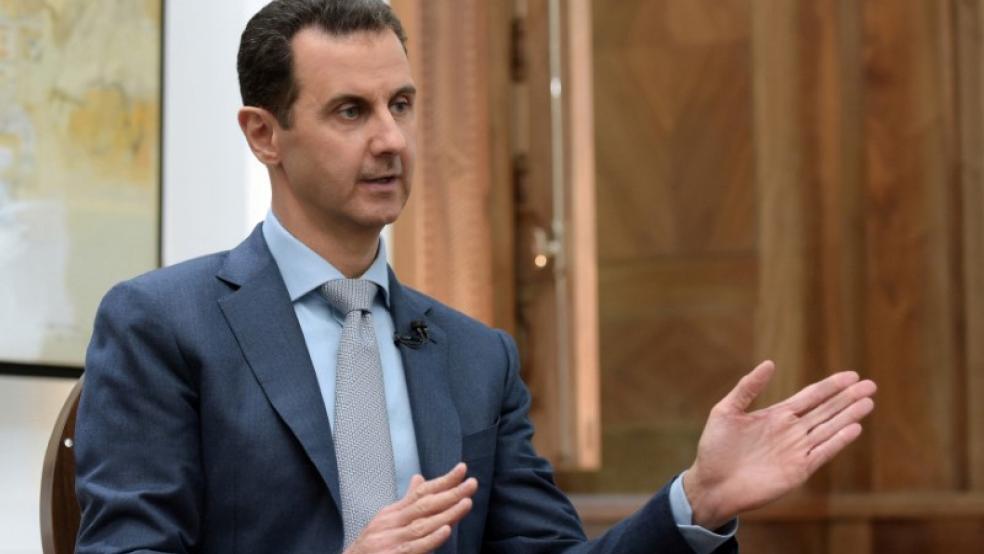More than 48 hours after President Trump ordered a missile assault on a Syrian government airbase as retaliation for a chemical weapons attack that killed dozens of civilians in the town of Idlib, the administration was still unable to articulate a clear explanation of how US policy toward Syria and its leader, Bashar al-Assad, has changed, and why.
Top officials from the administration, including Secretary of State Rex Tillerson, United Nations Ambassador Nikki Haley, and Lt. Gen. H.R. McMaster, the White House National Security Adviser all appeared on the Sunday talk shows, and presented seemingly contradictory and at times, frankly incoherent explanations of what the United States’ role in the Syrian conflict will be moving forward.
Related: Trump Bombed Syria’s Airfield. Now, Here Comes Putin’s Response
Tillerson, for example, in an appearance on ABC's This Week, said that the US stands prepared to take additional action against Assad if he uses chemical weapons again, while at the same time making the plainly incorrect claim that this represents no change in US military policy toward Syria.
Asked by host George Stephanopoulos if he was saying that there had been no change in US posture on the use of force against Assad, he agreed. But then, he said, “The strike was a message to Bashar al-Assad that your multiple violations of your agreements at the UN, your agreements under the chemical weapons charter back in 2013 that those would not go without a response in the future.”
Of course, the strikes themselves were a major reversal for Trump, who campaigned as a non-interventionist “America First” candidate, and who has for years argued against getting involved in the Syrian civil war. And the promise of further attacks if chemical weapons are used again is plainly an escalation beyond a one-off “message” strike.
Until Thursday, the Trump administration seemed to be following the president’s original policy against greater involvement in Syria. As recently as March 30, both Tillerson and Haley had made public comments that seemed to suggest that removing Assad from power was at best a secondary goal for the United States and that his remaining was one possible outcome.
Related: America's Strike in Syria: The Generals Are Taking Charge
At the time, Tillerson said that “the longer-term status of President Assad will be decided by the Syrian people.”
On the same day, Haley said, “Our priority is no longer to sit and focus on getting Assad out.” She added, “Do we think he's a hindrance? Yes. Are we going to sit there and focus on getting him out? No.”
By April 6, the day of the missile attack, though, the language was notably different.
“Assad’s role in the future is uncertain, clearly, and with the acts that he has taken, it would seem that there would be no role for him to govern the Syrian people,” Tillerson said in a brief press conference.
“The process by which Assad would leave is something that requires an international community effort both to first defeat ISIS within Syria, to stabilize the Syrian country to avoid further civil war and then to work collectively with our partners around the world through a political process that would lead to Assad leaving,” he said.
Related: Here's What Firing 59 Tomahawk Missiles at Syria's Airfield Cost
Asked if he and President Trump would “organize an international coalition” to remove Assad, Tillerson responded, “Those steps are under way.”
On the same day, Haley also signaled that the US planned to lead an effort to remove Assad from power.
The immediate catalyst for the US decision to about-face and rain 59 Tomahawk cruise missiles down on an airfield as Trump sat down to dinner on Thursday night was the Syrian regime’s apparent use of the deadly nerve agent Sarin in the attack on Idlib earlier in the week. The gas attack killed dozens and produced images of small children dead on the ground and others gasping for breath as they struggled to survive the effects of the noxious gas.
But what many found puzzling was that the attack on Idlib was different only in degree from what Assad’s regime has been doing, with some consistency, for years. The list of chemical attacks on rebel-held parts of Syria is long and detailed, and as Tillerson pointed out in interviews on This Week CBS’s Face the Nation, the Syrian military used chemical weapons twice in the week prior to the Idlib attack.
Related: Trump Just Strengthened His Hand on Defense Spending
It’s also unclear why gassing civilians drew such a dramatically different response than indiscriminately blowing them up with conventional explosives and the Assad regime’s “barrel bombs.”
It was a question that McMaster struggled to address in an appearance on Fox News Sunday.
“We’re prepared to do more,” McMaster said. “We were prepared to do more two days ago as well. What’s significant about this strike is not that it was meant to take out the Syrian regime’s capacity or ability to commit mass murder of its own people but it was to send a very strong signal to Assad and his sponsors that the United States cannot stand idly by as he is murdering innocent civilians
Host Chris Wallace followed up by pointing out that Assad is still committing mass murder, just with different weapons, and asking if the US is now prepared to retaliate against him for attacks on civilians with conventional weapons as well. After several attempts to pin McMaster down, Wallace had to be satisfied with this statement: “The president will make whatever decision he thinks is in the best interest of the American people.”





